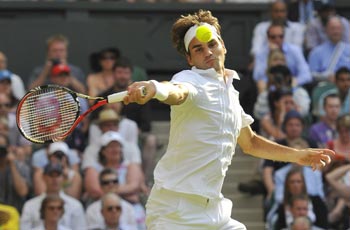 | « Back to article | Print this article |
Soccer needs technology, tennis does not: Federer
 A controversial goalline decision at the World Cup only served to back up what Roger Federer already suspected -- that soccer needs replay technology and tennis does not.
A controversial goalline decision at the World Cup only served to back up what Roger Federer already suspected -- that soccer needs replay technology and tennis does not.
The case for introducing technology to aid soccer referees was brought into focus on Sunday when England's Frank Lampard was not awarded a goal in the match against Germany despite the ball clearly crossing the line.
England went on to lose the second-round match 4-1, but the decision not to allow Lampard's first-half strike was a major talking point.
HawkEye, which is used to decide whether a ball has landed in court, was first used at Wimbledon in 2007, but FIFA president Sepp Blatter -- a Swiss compatriot of Federer's -- opposes introducing a similar system for soccer.
Federer, a long-time critic of the HawkEye system in tennis, said the significance of goalline decisions meant it was high time soccer followed tennis's lead.
"We have electronic line calling even though we don't need it," the Swiss said after waltzing into the quarter-finals at the All England Club with victory over Austria's Juergen Melzer.
"They should have it, and they don't. So it's a choice the guys have to make at the top. I think it's rough. To me it seems like it's just crying (out) for a change.
"One forehand down the line doesn't change the outcome of the match; whereas one goal changes the entire mindset of a team, of a strategy," he added.
Federer said tennis had line judges whose only job was to oversee line calls and so HawkEye was unnecessary.
"Guys are sitting there, not moving. They're only staring at the line. It's so much more simple. It's going to even out throughout a career or a season, the good and bad calls.
"Whereas goals, its such a huge impact in those 90 minutes. It changes everything," he added.

© Copyright 2025 Reuters Limited. All rights reserved. Republication or redistribution of Reuters content, including by framing or similar means, is expressly prohibited without the prior written consent of Reuters. Reuters shall not be liable for any errors or delays in the content, or for any actions taken in reliance thereon.